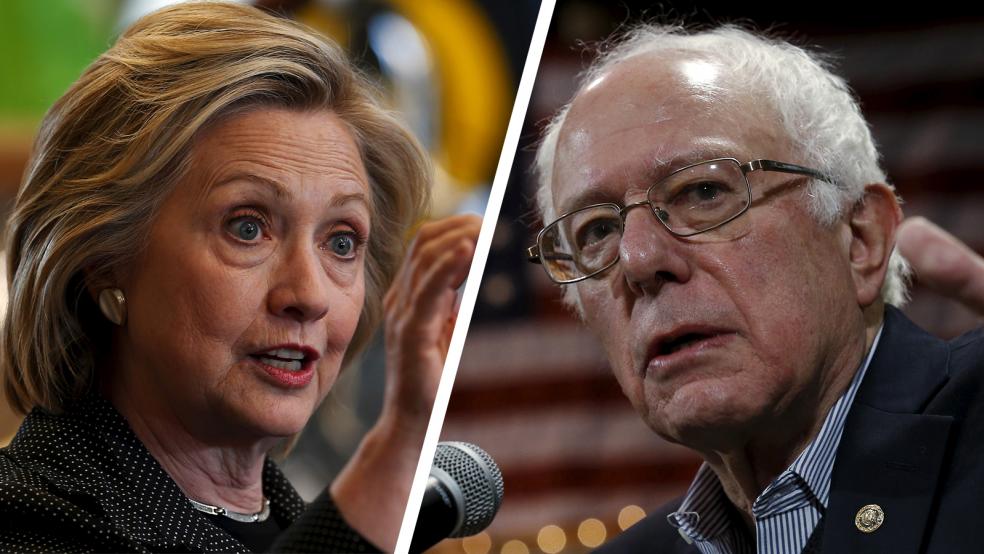Hand-wringing among Democrats has been trending upward along with presumptive Republican presidential nominee Donald Trump’s poll numbers. The New York billionaire and Hillary Clinton are tied within the margin of error in national polling, with Trump sometimes holding a slight edge.
Given Trump’s general unpopularity, that’s not the way things were supposed to be, and many in the Democratic Party are starting to cast withering glares at Vermont Sen. Bernie Sanders, concerned that his persistence in waging a doomed campaign to topple Clinton is reducing the amount of time she has to unite a party that his candidacy has divided.
Related: Dems Offer a Different Sort of Challenge to Trump’s ‘Manhood’
As Ron Brownstein, writing for The Atlantic, put it, “The nightmare precedent for Clinton strategists is a replay of the 1980 convention, which was dominated by Jimmy Carter’s largely unrequited pursuit of reconciliation with his own liberal challenger, Senator Edward M. Kennedy.” Carter, of course, went on to lose to Ronald Reagan in the general election.
However, academics who study American politics and longtime political analysts have a clear message for Democrats preparing to panic over the state of the party: Chill out.
Writing for Larry Sabato’s Crystal Ball, Emory University political scientist Alan Abramowitz argues for a little historical perspective. Democrats appear to be forgetting just how nasty the party’s 2008 primary between Clinton and then-Sen. Barack Obama was, and how deep the divisions between their supporters seemed, he says.
“Clinton battled Obama to the very end of the primary season in early June, winning several of the late contests. In the end, Clinton actually won slightly more votes than Obama in Democratic primaries but fell short in terms of delegates because of Obama’s overwhelming margins in caucus states.”
Related: Why Donald Trump’s Attacks on a GOP Governor Are ‘Stupid Politics’
However, despite the acrimony and the short-lived rise of the so-called PUMA Democrats -- anti-Obama activists whose acronym stood for “Party Unity My Ass” -- Democrats overwhelmingly supported Obama in the general election.
Bringing the party back together behind the nominee will probably be even easier in 2016, Abramowitz says.
“The major reason for this is that Donald Trump is a far less attractive alternative to disgruntled Democrats than John McCain was in 2008,” he writes. “And no matter what Sanders does, someone else should be extremely helpful when it comes to unifying Democrats once the primary contest is over: President Obama.”
In 2008, Clinton eventually endorsed Obama strongly, and her backing (and that of her husband, former president Bill Clinton) at the nominating convention and beyond, no doubt helped win over her disappointed supporters.
Related: Is This How Nancy Pelosi Turns Sanders Supporters into Clinton Voters?
Sanders has already indicated that he will endorse and campaign for Clinton against Trump, as Clinton did for Obama eight years ago. However, in that election the Democrats didn’t have the benefit of an incumbent president who enjoys a positive favorability scores of 88 percent among Democrats as a whole, and 82 percent among the defeated candidate’s supporters, as Obama does.
And of course, there are Trump’s enormous deficits with key segments of the electorate -- women, Hispanics, African Americans -- that will be difficult, if not impossible, to overcome.
Clinton has her own baggage, to be sure. She’s almost as unpopular as Trump, and as yet another report on her use of a private email server while secretary of state shows, has plenty of ghosts from her past that will continue to haunt her. However, there’s good reason to believe that barring something truly surprising and unexpected, Clinton’s past will be more of an annoyance than a real problem.
In the end, according to observers like Abramowitz and Brownstein, Democrats’ anxiety about a Clinton v. Trump general election is probably not very well founded.
As Brownstein reminds readers, “The history in both parties is that primary wounds eventually get healed. But with Trump stirring in these early polls, that healing process can’t start too soon to soothe the nerves of anxious Democrats.”





